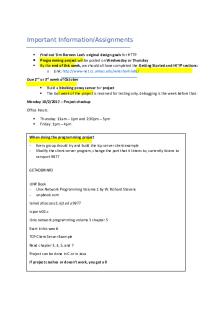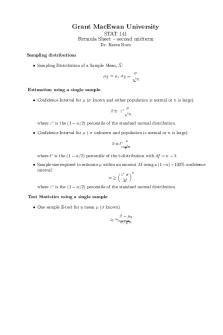MLL117 w2 - Lecture notes 2 PDF

| Title | MLL117 w2 - Lecture notes 2 |
|---|---|
| Course | Misleading Conduct & Economic Torts |
| Institution | Deakin University |
| Pages | 3 |
| File Size | 63.2 KB |
| File Type | |
| Total Downloads | 36 |
| Total Views | 136 |
Summary
Week 2...
Description
Q1 - Innuendo What was the legal innuendo on which Cornes relied to establish a defamatory meaning? Why do you think that the imputation of a sexual relationship would not have been sufficient on its own to establish defamation? Was the Court satisfied that there were viewers who would possess the extrinsic information needed to draw this legal innuendo? A legal innuendo refers to a defamatory meaning that would only be conveyed to someone with extrinsic information. Therefore would the ordinary, reasonable person with the relevant extrinsic information draw a defamatory meaning? In the case of Cornes the legal innuendo relied upon is Nicole Cornes high profile marriage to Adelaide football identity Graham Cornes. Justice Peek was satisfied that her marriage to her husband had been a high profile with media attention. Accordingly, his Honour was prepared to infer that a ‘significant number’ of viewers would have known of the marriage. [109] I consider that the ordinary reasonable viewer, having regard to the context of the entire programme and to the particular context of the interview with Mr Dew, would have understood the meaning of Mr Molloy’s words to be that the plaintiff had engaged in consensual sexual intercourse with Mr Dew. I further consider that an ordinary reasonable viewer, aware that the plaintiff was married at the relevant time, would have understood that the plaintiff was unfaithful to her husband and that she had committed adultery. I do not consider that any comedic aspect would detract from these understandings. I include the banter that took place between panel members during the interview with Mr Dew.
Q2 - The 'single meaning' rule What are the origins of the single meaning rule? Why is it important as a matter of policy to identify one single meaning of the words that would be drawn by the ordinary reasonable person? The single meaning rule means that only one meaning or imputation can be drawn by the ordinary reasonable person from a matter. But the recognition that there may be more than one meaning which reasonable men might understand words to bear does not absolve the jury from the duty of deciding upon one of those meanings as being the only ‘natural and ordinary meaning’ of the words. Juries, in theory, must be unanimous upon every issue on which they have to adjudicate; and since the damages that they award must depend upon the defamatory meaning that they attribute to the words, they must all agree upon a single meaning as being the ‘right’ meaning. And so the unexpressed major premise, that any particular combination of words can bear but a single ‘natural and ordinary meaning’ which is ‘right,’ survived the transfer from judge to jury of the function of adjudicating upon the meaning of words in civil actions for libel. But where an action for libel is tried by a judge alone without a jury, it is he who has to arrive at a single ‘right’ meaning as ‘the natural and ordinary meaning’ of the words complained of; and with the concentration of functions in a single adjudicator, the need for his
distinguishing between meanings which words are capable of bearing and the choice of the one ‘right’ meaning which they do bear disappears. According to Justice Blue, does the single meaning rule prevent a plaintiff from pleading multiple imputations? What is the interaction between this rule and a legal innuendo? This does not prevent the plaintiff from pleading multiple imputations.
Q3 - Background knowledge What background knowledge could be attributed to the viewers of the program? Could this include knowledge about previous episodes of the program or the comedic reputations of the panellists prior to the subject broadcast? -Knew of marriage. -Not expected to have viewed any previous programming. -Keener ear for personal life disclosures rather than Mick Malloy's comedic abilities. -Strong intrest in the affairs of clelebrities.
Q4 - The entirety of the publication Was the ordinary reasonable viewer expected to watch the whole show? If so, what conclusions would they draw about the usual nature of Molloy’s contributions? -The ordinary reasonable viewer should be able to draw that Malloys contributions are usually comedic.
Q5 - The imputation Why did the court consider that the ordinary reasonable viewer would interpret the words seriously, even though they were intended as a joke? What did Chief Justice Kourakis personally understand the words to mean? Why then did he believe that the ordinary reasonable viewer would understand them in a different way? First, I observe that the natural and obvious meaning of Molloy’s words, ‘and apparently you slept with her too’ spoken about Stuart Dew’s association with Mrs Cornes is that he had sexual relations with her and, therefore, for those who had knowledge of her marriage to Graham Cornes, that she had committed adultery. Obviously enough then, that meaning is not a strained, forced or unreasonable construction of words. -No reason to think that only people familiar with the commedians or the prigram watched the show. -Poor timing. -Comedy and gossip may not be mutaully exclusive.
Q6 - The context of the publication What was the relevance of the fact that the show was not purely a comedy show, such as a comedy sketch show, but also sought to convey information to viewers about serious topics? The fact that the show was not a pure comedy program and instead also sought to convey serous information would mean that toe ordinary reasonable viewer would likely hold assertions made by the program to a higher esteem or may fail to adequately distionguish between the comedic and favtual nature of the program.
Q7 - Bane and antidote Why were the swift denials by the other panellists ineffective as an ‘antidote’ to the defamatory ‘bane’? Mr Dew could be expected to deny the allegation, whether true or false, to protect the plaintiff and this would be seen by the ordinary reasonable viewer who understood that she was married as even more reason to deny the allegation. The Judge made the further point that Mr Maher’s role was to make introductions and farewells and to keep the show, including the interview, running smoothly and to deal with any problems that might arise. In the Judge’s view, the ordinary reasonable viewer would recognise that Mr Maher would not have knowledge of the private life of either Mr Dew or the plaintiff and that, in these circumstances, his statements would not constitute an antidote. Finally, the Judge referred to the change of mood that overhung the interview following Mr Molloy’s utterance and that Mr Maher’s statement ‘[n]o one here has got any idea what the hell we are talking about’ were not jocular in nature and were words ‘redolent of an immediate appreciation that [Mr] Molloy had gone too far and a desire, almost desperate in nature, to get away from that area as soon as possible’. if it was clear that Mr Molloy’s words were not to be taken seriously or were merely teasing, no one would have attempted to deny them or to defuse the explosive situation that resulted. -Silence by Malloy -Dew would have of course denied it to protect her....
Similar Free PDFs

MLL117 w2 - Lecture notes 2
- 3 Pages

W2 Reinvent SW - Lecture notes 2
- 4 Pages

BUSS1040 W2 - Lecture notes
- 73 Pages

ISB 202 W2 Notes
- 1 Pages

ADV 342 W2 Notes
- 2 Pages

W2 summary notes
- 4 Pages

W2 korelacja 2
- 11 Pages

W2 - Unit-2 Assignment
- 3 Pages

Lecture notes, lecture 2
- 3 Pages

2 - Lecture notes 2
- 5 Pages

Lecture notes, lecture Chapter 2
- 11 Pages

Lecture notes, lecture formula 2
- 1 Pages
Popular Institutions
- Tinajero National High School - Annex
- Politeknik Caltex Riau
- Yokohama City University
- SGT University
- University of Al-Qadisiyah
- Divine Word College of Vigan
- Techniek College Rotterdam
- Universidade de Santiago
- Universiti Teknologi MARA Cawangan Johor Kampus Pasir Gudang
- Poltekkes Kemenkes Yogyakarta
- Baguio City National High School
- Colegio san marcos
- preparatoria uno
- Centro de Bachillerato Tecnológico Industrial y de Servicios No. 107
- Dalian Maritime University
- Quang Trung Secondary School
- Colegio Tecnológico en Informática
- Corporación Regional de Educación Superior
- Grupo CEDVA
- Dar Al Uloom University
- Centro de Estudios Preuniversitarios de la Universidad Nacional de Ingeniería
- 上智大学
- Aakash International School, Nuna Majara
- San Felipe Neri Catholic School
- Kang Chiao International School - New Taipei City
- Misamis Occidental National High School
- Institución Educativa Escuela Normal Juan Ladrilleros
- Kolehiyo ng Pantukan
- Batanes State College
- Instituto Continental
- Sekolah Menengah Kejuruan Kesehatan Kaltara (Tarakan)
- Colegio de La Inmaculada Concepcion - Cebu



